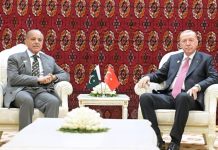DM Monitoring
ANKARA: NATO’s expansion policies should go in line with the sensitivities of long-time member Turkey, the nation’s President Recep Tayyip Erdogan has said, weeks after signing a protocol with membership hopefuls Sweden and Finland.
Referring to conditions in a memorandum the two Nordic countries signed with Turkey at last month’s NATO summit in Madrid, Recep Tayyip Erdogan on Monday warned after a Cabinet meeting in the capital Ankara: “I repeat it again that we will freeze their NATO accession process if the conditions are not met.” “Sweden does not look good in that regard. Our stance is resolute, the rest is up to them,” he added. Ankara and the two Scandinavian countries had signed a memorandum that allows the countries to become NATO members but requires them to take steps on Turkey’s terrorism concerns and lift an arms embargo on Ankara.
Following the memorandum, NATO formally invited Sweden and Finland to join the 30-member military alliance.
Earlier this month representatives from NATO’s 30 member states signed accession protocols for Finland and Sweden after formally inviting them to join the military alliance.
Spurred by Russia’s offensive in Ukraine, the two countries applied to join NATO in May, shedding their traditional neutrality.
But Turkey voiced objections to their membership bids, criticising the countries for tolerating and even supporting terrorist groups such as the YPG/PKK and the Fetullah Terrorist Organization (FETO).
In its more than 35-year terror campaign against Turkey, the PKK – listed as a terrorist organisation by Turkey, the US, and the EU – has been responsible for the deaths of over 40,000 people, including women, children, and infants.
FETO and its US-based leader Fetullah Gulen orchestrated the defeated coup of July 15, 2016, in Turkey, in which 251 people were killed and 2,734 injured. FETO is behind a long-running campaign to overthrow the state through the infiltration of Turkish institutions, particularly the military, police, and judiciary.
Russia’s invasion of Ukraine has prompted Sweden and Finland to abandon their long-held nonaligned status and apply to join NATO. However, Turkey had opposed the move on the grounds that these two countries were supporting terrorist organizations.
The agreement comes at the opening of a crucial summit dominated by Russia’s invasion of Ukraine. U.S. President Joe Biden and other NATO leaders arrived in Madrid for a summit that will set the course of the alliance for the coming years. The summit was kicking off with a leaders’ dinner hosted by Spain’s King Felipe VI at the 18th-century Royal Palace of Madrid.
Diplomats and leaders from Turkey, Sweden and Finland earlier held a flurry of talks in an attempt to break the impasse over Turkey’s opposition to expansion. The three countries’ leaders met for more than two hours alongside Stoltenberg on Tuesday before the agreement was announced.
Sweden’s Prime Minister Magdalena Andersson hailed the “very good agreement” with Turkey and said the move would make the alliance stronger.
“Taking the next step toward a full NATO membership is of course important for Sweden and Finland. But it’s also a very important step for NATO, because our countries will be security providers within NATO,” Andersson told Agence France-Presse (AFP) in an interview.
Meanwhile, British Prime Minister Boris Johnson also hailed Turkey’s agreement to drop its objections to Finland’s and Sweden’s membership of NATO. “Fantastic news as we kick off the NATO Summit. Sweden and Finland’s membership will make our brilliant alliance stronger and safer,” Johnson wrote on Twitter.
On the other side, a U.S. official said on the same day that Turkey did not demand concessions from Washington to support Finland and Sweden.
“There was no request from the Turkish side for the Americans to make a particular concession,” a senior administration official told reporters.
Speaking on condition of anonymity, the official called Turkey’s decision a “powerful shot in the arm” for NATO unity.



